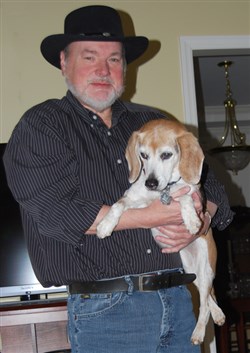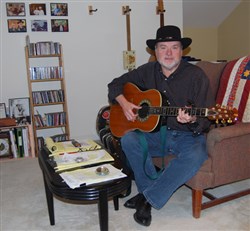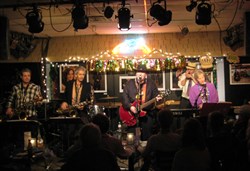VOL. 42 | NO. 7 | Friday, February 16, 2018
Kerr finds winding path to success in Music City

Les Kerr with Belle, the beagle he and his late wife, newspaper columnist Gail Kerr, adopted 15 years ago from a breeder in Ashland City. “When we got there, this beagle came running straight to Gail,” he recalls.
-- Tim Ghianni | The LedgerLes Kerr, purveyor of what he calls “hillbilly blues Caribbean rock ’n’ roll” in a town where faux-cowboy music and lusty songs about pickup trucks reign, leans back in a chair in his “music room/office” and noodles with the 1975 Ovation guitar his grandfather gave him as a high school graduation present.
“I don’t play this one out much,” he says, as a squad of guitars and guitar-cases fight for space next to the chair where he sits.
After picking a few stray melodies on the treasured guitar, he slides right into “Dueling Banjos” – the theme song from the classic film “Deliverance.” Without a pause, he leans back a fraction and sings bluesman Mississippi John Hurt’s “My Creole Belle,” while the 15-year-old beagle named for that song looks disinterested and weary.
“When I got here, people asked me if I was a country singer. I said ‘No!’ Unfortunately, Music Row agreed,” says this affable 61-year-old as he conducts a verbal tour of the room filled with music and memorabilia, including a reproduction of the train depot sign from his hometown Pascagoula, Mississippi, nudging up against a poster of Satchmo.
“This is where I come when I need to remind myself why I moved to Nashville,” he says, scanning the bonus room at his Bellevue house.
This upstairs “museum” chronicling a life spent in music is a sort of a “It’s the music, stupid,” reminder to keep playing, keep improving, keep nurturing audiences from here to the Florida Panhandle and all the way over to New Orleans.
Among the treasures on his walls is a Sun Records LP, with Johnny Cash’s personalized autograph on the actual vinyl disc. Roy Acuff, John Hartford, Bill Monroe, a trio Les’ many influences, also have autographed items framed.
Hell, there’s even a glossy black-and-white “road movie” publicity shot of Bob Hope, Dorothy Lamour and Bing Crosby. Only Hope signed it, but that’s because Les never found himself in the company of Crosby – one of his favorite American crooners – or Lamour, who I suppose would nowadays be relegated to movie “hottie” status. “I love entertainers,” he adds of that Hollywood trio.
Downstairs in this home in a Bellevue subdivision are framed concert posters of Flatt & Scruggs, B.B. King, and Jimmy Buffett, as well as a framed picture of Elvis that he got when his folks went to see the king in 1970. Three ticket stubs – from the Elvis concerts he attended – are lined up below the picture.
The three posters and the Elvis “memorial” illustrate Les’ unique burgoo of hillbilly, blues, Caribbean and rock ‘n’ roll music.
After sniffing me for the scent of my rescue huskie Roxy, Belle settles down on her bed in the living room.
Belle was adopted as a puppy when Les and his wife, Gail (longtime Tennessean columnist Gail Kerr) really started missing the dogs with which they’d lived before.
I should note here that Gail was a friend and a colleague of mine for something near two decades, back when I was a columnist and editor at the old Nashville Banner and then during my decade as senior features writer and entertainment editor (and other posts) at the city’s morning newspaper.
“Belle’s great company,” Les adds.
She also has changed his rambling ways.
When he first began playing gigs either as a solo or with his ever-changing-but-stellar Bayou Band, Gail would take care of Belle while Les did what musicians do … ramble blue highways to perform at house parties, radio shows, beach side nightclubs and places like the infamous Flora-Bama Lounge on a tad of beach that straddles at the Florida-Alabama line.
Now, often as not, he plays within driving distance of getting home that night. “Had her for 15 years,” he says of Belle, adopted when the Kerrs “went up to Ashland City after we’d seen an article about someone who raised beagles,” Les recalls.
“When we got there, this beagle (which became Belle) came running straight to Gail.”
That was 15 years ago in June, and the beagle remains a big part of Les’ home life out in Bellevue, where he and Gail lived, where he still lives surrounded by mementoes of his music career.
“Gail was my biggest supporter,” says Les, 61, of his wife who died four years ago after battling multiple sclerosis and esophageal cancer.
“We met during a journalism fundraiser,” recounts Les, who practiced his radio news and blues and “Blue-Suede Shoes” at a variety of Deep South radio stations before he moved to Nashville in 1987.
“He was like so many pilgrims – of good, bad and ugly varieties – who come here with dreams of making it big.
“Gail came to most of my shows,” he says, noting her other musical favorites were Petty and Springsteen.
She especially enjoyed her husband’s music, like the annual Fat Tuesday performance by Les Kerr & The Bayou Band at the Bluebird Café.
That Nashville tradition, this year was its 27th, has become a favorite not just for the audience but for the bandleader, who inserts the laissez les bons temps rouler attitude into the generally quiet listening room in Lower Green Hills.
“Mardi Gras for me is like tax time for an accountant. I get very busy,” Les continues. “I did a private show this last Saturday.” And he had a pretty full slate during the days surrounding Fat Tuesday.
But the actual evening of Fat Tuesday is spent at The Bluebird, where club founder and nice person Amy Kurland gave Les – who already had been performing some 9 p.m. singer-songwriter shows (the favored time slot) – the go-ahead to try a Mardi Gras show at the club that is generally a quiet place where troubadours congregate and trade licks.

Les Kerr in his Bellevue “museum” home, where he is surrounded by autographs photos, posters and records, as well as the instruments he has accumulated over the years.
-- Tim Ghianni | The Ledger“It’s something,” Les adds. “People come every year. For some, it’s the only show they come to all year. They love Mardi Gras and are there always.
“You’d be amazed at the number of people who’ve never heard of Les Kerr, but they have heard of Mardi Gras. That’s what gets them in the door,” he says, laughing at his own modesty.
“Every year I think I gain in my goal of being well-known. I’m world-famous in a small group.’’
Except for a slow month in August, he stays plenty busy, while generally making sure he gets home in time to tend to Belle. That’s actually a habit he got into when his wife was ill.
“I would try to get home every night if I could. I may be playing in Decatur, Alabama, but I’d come back to be with Gail that same night.”
His love of music was fueled by his mother’s love of listening to Tommy Dorsey and Frank Sinatra.
And that’s pretty much what led Les to begin listening to and learning all sorts of music, squeezing in performances not just during his radio days, but going all the way back to his high school years, before he got his journalism degree at Ole Miss.
“One of my biggest influences was Elvis Presley. When I was in high school, I had a rockabilly band called ‘Les Ker & The Blue Suede Band.’’
Sadly, for Les and his band mates, rockabilly was not the way to get girls back then. “Everyone would be listening to Emerson, Lake and Palmer; Crosby, Stills and Nash,” the popular music of the time.
“And I was doing Elvis music, Chuck Berry music, Little Richard songs. … I knew we’d made it when we got on a show at Channel 13 in Biloxi.”
He studied journalism and continued honing his musical style during his college years.
“When I went into college at Ole Miss, I started writing songs, because the singer-songwriter thing was growing then,” he says, naming top acts like Sweet Baby James, Jackson Browne and Jim Croce.
Not only was he leader of the Blue Suede Band, named of course for the Elvis Presley version of rockabilly good guy Carl Perkins’ signature song, he also joined a bluegrass band.
“The atmosphere was charged with a lot of creative people.” He began taking theater courses so he could be around some of those Rebels students.
He also began performing at a local folk music club, another experience he says “kind of fanned the flame” that led to him aiming for a life as a musician.
And, though Kris Kristofferson was hardly Elvis, Les and his various bands learned and performed that country music Hemingway’s songs.
“Even when I was playing rockabilly, we learned Kris Kristofferson songs. I’d be singing our songs and then perform something like ‘The Pilgrim: Chapter 33,’” among my friend Kris’ best and grittiest autobiographical tales.

Les Kerr and the Bayou Band at their annual Fat Tuesday performance at the Bluebird Cafe in Green Hills in 2012.
-- Submitted“Country music really wasn’t that much of a stretch. I heard Buck Owens say that ‘if Chuck Berry had been white, he would have been a country singer,’” Les notes. The great, duck-walking showman – who died last year – wrote and sang story songs, virtual poetry if you stopped dancing and listened to “Maybellene,” “Brown Eyed Handsome Man, “Johnny B. Goode,” “Memphis, Tennessee” and my personal favorite Chuck song “No Particular Place to Go,” just for starters.
Les goes on to cite some of his other favorites, leading with Elvis and visiting Jimmy Buffett, Springsteen.
“The key is communication. All of them were great communicators. That’s what you need to be on a stage.
“Somebody I admired a lot was Roy Acuff,” he acknowledges.
In fact, while working at radio stations, he’d spend his free time in Nashville, gathering interviews for his shows while standing shoulder-to-shoulder with giants.
“Mr. Acuff wasn’t a great singer, he was a great communicator. …. I was lucky enough to spend an hour and a-half with him one hot, Sunday afternoon backstage at the Grand Ole Opry House.”
He smiles at his memories of that time spent with “The King of Country Music,” a title Mr. Acuff earned every time he took the stage with his fiddle and yo-yo and blasted into “Wabash Cannonball.”
“I would take these little trips to Nashville. Kind of get my feet wet. I knew someday I’d be here. I loved the music I grew up listening to” on the radio, including, of course, WSM-AM’s Opry broadcasts.
So eventually, he packed his belongings and his hybrid musical influences and came “home” to Nashville.
He tried to make it in the normal “Nashville way,” but he struggled. “I studied songwriting and hung around with a lot of other songwriters who were writing songs together.
“Some people can do that. I wrote some of the worst songs I could have wrote when I was a singer-songwriter.”
He quickly realized he was happier taking his unique mash-up of musical styles onto the stage and on CDs.
“I decided ‘I’m probably not going to compete with these new up-and-comers like Clint Black and Garth Brooks,’ so I found my own audience. I was 30, probably already too old, when I moved to Nashville.
“I realized I would probably do better if I found my niche, so I decided ‘I’ll just continue to do what I’ve been doing. If people in Nashville already are responding to what I’m already doing, why change?’”
“I love to perform, I love to tell stories and be in front of people,” he says. By the way, he still employs his old radio announcer chops when he serves as a host during Channel 8-WNPT fund-raising crusades. For example, he hosted the broadcast of the Nitty-Gritty Dirt Band’s 50th anniversary celebration.
He’s also played at WNPT studios with Sam Bush – an instrumentalist, aka “The King of New Grass,” and with Dirt Band-cofounder Jeff Hanna.
And a four-piece version of the Bayou Band played for a show called “Civil War Songs and Stories” that got national exposure.
This fellow, who also writes for some freelance projects, is proud that he and the Bayou Band are regular performers along the route of The Rock ’n’ Roll Nashville Marathon, where Music City’s artists play at assigned spots along the course.
“It’s a thrill to play for 30,000 people. Of course, they only hear a little bit when they run past us. I always joke that ‘I make music that makes people want to run.’”
The Bayou Band, by the way, grows and shrinks depending on recent paydays.
“The size of my budget and who is available on given nights” determines if the band becomes its full complement of eight or if it’s a smaller number.
“With the Bayou Band, I have so many wonderful players. It works out just fine. I’m spoiled by living in Nashville with all of these great players and good people,” eager to climb onstage with him.
“I love what I do and I want to do more of it. Continue to grow as an artist, as a songwriter. Make it bigger, but even if I don’t I’m still happy with the niche I have found …
“I’m gaining more ground. The internet is helping some. Just this last week I did a Facebook Live concert.
“I feel like I’m just getting started.”